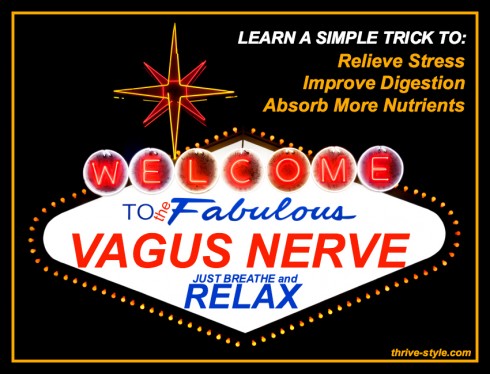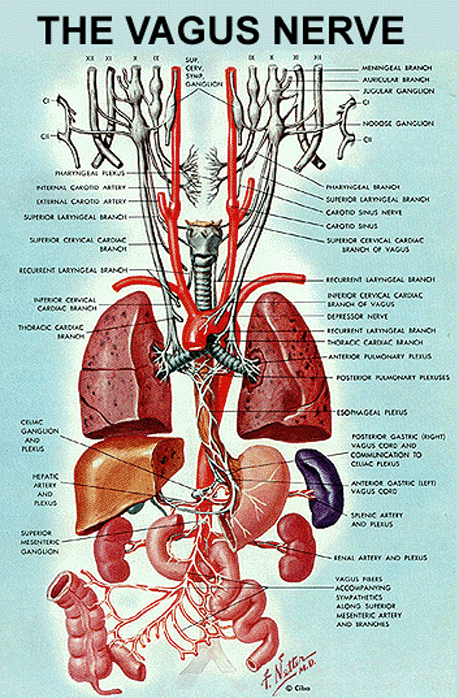Generally, when I discuss the vagus nerve and its profound impact on stress levels (and all the associated physiological effects) with clients, they quietly repeat the word Vegas, and then giggle (men included). The funny thing is, I’ve never been to Vegas and my science-loving brain automatically thinks Vagus whenever I hear either word.
Why is the vagus nerve so darn important?
In relation to stress management and disease prevention, the answer is pretty simple:
1. When you breathe deeply into your belly, it stimulates the vagus nerve, which then sends a message to the brain telling it to make the body relax. Stress hormone production is reduced, and other physiological stress effects (like capillary constriction, muscle tension, decreased digestion, etc.) are improved as well. The result? In the moment, you feel better and in the long-term you help prevent disease.
As if you need another reason…
2. When the vagus nerve is stimulated, and the body is able to focus more on digestion, nutrients are absorbed more effectively. If we look at it in the opposite direction: when you’re stressed, your body is not absorbing nutrients properly, so you can have the healthiest diet going and be completely malnourished. Take a few deep belly breaths before you chow down, and you set yourself up to use the nutrients you’re eating…rush through meals while you’re on the Internet, watching TV or not breathing deeply? Well, you’re just nourishing the sewer system!
Quick and Easy Tips:
1. Practice breathing into the deep low belly button area of your gut whenever you remember to. I have lots of trouble with this–I’ve been sucking it in and tightening it up since I got serious about gymnastics many (many) years ago. If it’s hard for you, first practice while you’re lying down or totally supported sitting up. I recommend breathing in through your nose, and then out in whatever way feels best. In yoga, we breath out through our noses, but in relaxation classes many people teach breathing out through your mouth. If you’re not sure, don’t worry—the out breath will happen automatically!
2. When you sit down to eat (at your table without the TV or Internet), sit up straight, and take a couple deep breaths before you begin to eat. If you catch yourself hoovering your dinner, pause and take another deep belly breath. You’ll be better nourished, feel better, and even eat less because you’re more connected to your body.
3. You can also practice soft belly breathing with a guide. Dr. James Gordon of the Center for Mind Body Medicine (CMBM) developed a soft belly guided meditation and I have recorded a version of it for my clients to use. It’s only about 7 minutes long, and you can do it anywhere even in line at the grocery store—keep your eyes open there of course 🙂

Do you have any quick relaxation tips?
I like soft belly breathing, and I also love yoga. Sometimes I really don’t feel like going to class…and that’s usually when I need to the most!
Do you catch yourself eating too fast, on the run, or with distractions?
Please click +1 and comment below! How do you relax?



Pingback: goal setting worksheet
Pingback: Law Firm Marketing
Pingback: Air Conditioning
Pingback: Classifieds
Pingback: davenport legal group Quantum International
Pingback: al johnson houston
Pingback: power trip iPhone app
Pingback: supplements for tinnitus
Pingback: how to lose weight fast in 90 days
Pingback: rift macros
Pingback: storm kimonos
Pingback: Another Blog Title
Pingback: Training Solutions
Pingback: Search Engine Optimisation SEO Services
Pingback: white ceramic watches for women
Pingback: montre hello kitty
Pingback: Sell Services
Pingback: gamechanger dna
Pingback: UK Online Marketing
Pingback: sizegenetics
Pingback: Nail Lacquer
Pingback: custom orthotics
Pingback: Printable Calendars 2012
Pingback: Christmas Party Invitations
Pingback: Escorts
Pingback: Best Auto Insurance Quotes
Pingback: Anti aging blog
Pingback: ben downers
Pingback: Scrap Gold Pittsburgh
Pingback: Yoga and Breathing for Relaxation …and Your Skin!
Pingback: Waking Up at 3am...What does it mean and what can you do about it? -
Pingback: MIX | Wellness solutions for a balanced life